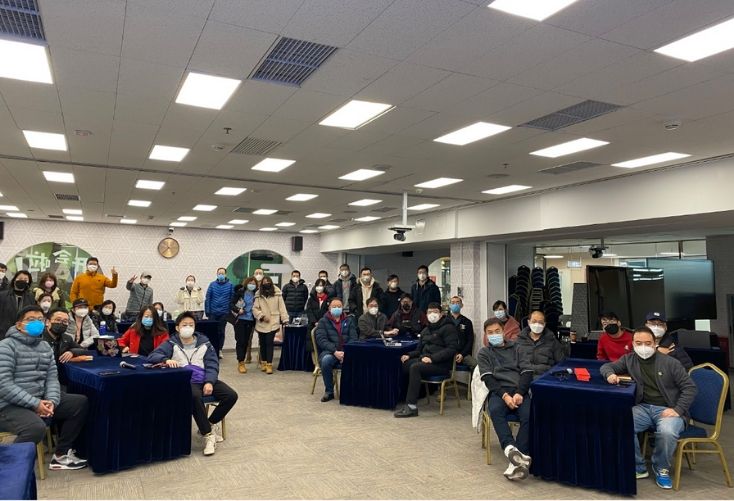- Many offices and businesses in China have closed in the wake of the Coronavirus outbreak.
- What is the impact on China’s flexible workspace sector, and the business communities that use it?
- Robert Kropp spoke with Josh Zhang, Chief Strategy Officer and Executive Partner at Ucommune, to learn about their experiences.
Coronavirus (COVID-19) has had a significant impact on the coworking and shared workspace industry in China. However, workspaces are pushing back.
With 72,000 workstations and over 600,000 members across 42 cities, Ucommune is one of the largest coworking and shared workspace companies in China and the world.
With many of the roads, highways, airports, railways, and other methods of transport limited or closed off in China, particularly in its cities, many offices and workspaces have remained shut or have had a drastic reduction in the number of people that have been able to get back to work within them.

What responses and changes have been needed to counteract these challenges over the past two months, and what does the future hold?
I had the pleasure of chatting with Josh Zhang, Ucommune’s Chief Strategy Officer and Executive Partner about all of this and more.
The Impact on Ucommune and Other Shared Spaces
Mr Zhang said that “according to our site manager’s survey (offline/online/telephone), only around 20% of companies in Ucommune” nationwide are “back to work.”
Their normal occupancy rate is 80%.
“We estimate the number will go back to roughly 40% by the end of this month (February) and with the situation getting better, the number can steadily go back to 75% by the mid of March.“
There was some additional discussion about whether it would be by the middle or end of the month but generally the expectation is every week or two will have a 10 – 20 % shift.
Due to the difficult nature of the spread of the Coronavirus and the fears surrounding it, Mr. Zhang and management have also been working with their onsite teams to do ongoing surveys of members in order to determine what members need and how they can better support them.
He also said that they contacted many “companies in our coworking (spaces), most of which are startups. They are the most fragile group in such a situation. We tried to collect as many problems as possible and use our channel to send to relevant government departments to see what can be done to help.”
He continued to add that we “can see many public economists and VIPs taking similar action in order to try to raise the awareness of SMEs” as well.
New Processes to Manage Risks of Coronavirus in Shared Workspaces
Mr. Zhang mentioned that they have implemented new processes for their workspaces and the members and companies coming back to work.
New Member Processes:
1. Taking body temperature twice (once after entering the building and a second time when entering the coworking place).
2. Everyone who enters the coworking space is required to fill in a form.
3. Wearing a mask all day when working in the office.
4. Those who come to work are asked to sit at a distance from each other and stop using meeting rooms etc.
New Ucommune Processes:
1. Providing disinfectant and disposable mask.
2. Disinfecting offices every two hours.
This is just a sample of some of the new processes, but it is clear that Ucommune is committed to providing as safe a working environment as possible.
New Tools, Benefits, and Access to the Network of Workspaces
The basics of protecting members is one aspect of support, however, what I found interesting was the importance of one of the key benefits of coworking and shared workspaces: community support.
A coworking or shared workspace is not just a place to work. It can be a support structure that looks out for the community of people as a whole.
Done well, this can have a massive impact on whether someone is successful, healthy, and productive.
Ucommune has been busy developing new tools and helping its members through these difficult times with the following:
1. Developed an online platform at the end of January to collect requests from members, like requests for masks, protective clothes and links to related suppliers and government departments.
2. Built a media platform that covers a large number of mainstream media to help members under such conditions.
3. For those who cannot come to their place of work, they can use Ucommune in a location closer to home.
Policy and Tax Changes
Mr Zhang also said that “our National News had announced that a decision was made by the state council to reduce relevant tax of SMEs from 2 – 4 months.”
There have even been regional tax measures released alongside national measures in China.
“For example, in Beijing, small and medium enterprises (SMEs) can apply for deferred tax payments of up to three months if they have trouble with tax filing and payments.”
“Shanghai SMEs are exempt from paying rent in February and March on state-owned assets for production and operations that are badly affected by the epidemic. Commercial property owners are allowed to apply for a reduction in property tax or land use tax.”
Remote Work, Technology, and Society
“During this time, most of the startups have started to use online working tools more often like Zoom, Dingding (Alibaba) and WeChat to communicate. It is indeed a challenge for entrepreneurs and how they lead their teams.”
I also had a moment to chat with Dane Anderson, SVP, International Research and Products at Forrester about remote work in China.
According to Mr. Anderson, “although it is changing, many countries in Asia (Japan, China, Korea, for example) are still more hierarchical and prefer a more traditional working model than North America or Europe.”
The current widespread use of remote work and work from home policies due to the Coronavirus could also lead to a greater awareness of the needs for changes in sickness and work policies. However, “right now companies are in the fog of viral war, so they’re not thinking about the mid or long term now as much as what’s right before them. Most companies and people revert to what they know and change is hard, but I do see this moving the needle.”
The Chinese government, Ucommune, and organizations across China are fighting to eliminate the potential of the Coronavirus to escalate, and many indicators display that they are moving in the right direction.
Are you working in China now? Whether you are working within or outside a coworking or shared workspace, I would love to hear from you and your experiences. How has your employer or organization adapted to the current global challenges? Tell me about your working experiences.



 Dr. Gleb Tsipursky – The Office Whisperer
Dr. Gleb Tsipursky – The Office Whisperer Nirit Cohen – WorkFutures
Nirit Cohen – WorkFutures Angela Howard – Culture Expert
Angela Howard – Culture Expert Drew Jones – Design & Innovation
Drew Jones – Design & Innovation Jonathan Price – CRE & Flex Expert
Jonathan Price – CRE & Flex Expert













